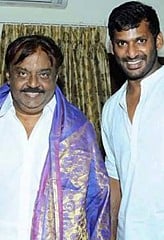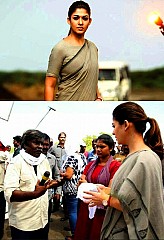

The key shots of the movie Aruvi introducing the titular protagonist are composed in a curious way. A few close-ups of the character are shown as dissected compositions as if to warn and induce the viewers to an intense character study. Writer-director Arun Prabu Purushothaman sets the formal and thematic prerequisites of the movie well through the first few sequences, and his female protagonist, Aruvi, played by Aditi Balan, watermarked on the viewers’ mindscape.
If the weight of a movie and its aesthetic depiction of a sensitive theme can be gauged by the divisive reviews it gathers, Aruvi is the best example to ponder over in contemporary Indian cinema. While it was picked up as an instant favourite by the social media soon after the release, there were reviews criticising it for the anti-feminist portrayal of the female protagonist. This phenomenon contributes to the genre-bending qualities of the movie and eventually elevates it as a trailblazer.
Director Arun Prabu Purushothaman chooses to play on the slippery turf of mixed genres, and the movie evokes everything a thriller, a tragedy or a comedy can on viewers who are conditioned to either hyper-realistic social dramas or hyper-fantastical extravaganzas. This very genre-bending plays a crucial role in maintaining a tight grip on the viewers, who are craving for a story with a character arc, without losing the movie’s emphasis on an intense character study.
In that sense, Aruvi marks a detachment from the usual narrative conventions of delivering a format structure and injects a considerable dose of radical storytelling into Tamil cinema. Here, we contradict the other major criticism against the movie. In an age of explicit political correctness prevailing over social media platforms, the movie boldly rejects it on its face in the second half, and takes a wild turn.
While the first half drives the viewers towards a bloody revenge drama, the director risks the viewers’ expectations to reach out to a chaotic redemption party in which the victim, the culprits and the middlemen celebrate their surrender to a deplorable destiny instigated by a hostile society. By the time Aruvi reaches its grand conclusion, every character in the movie is venerated as a victim of a rude and merciless social order. Here, those among the viewers who expected a clear-cut solution of allotting the cause of evil on an antagonist and gifting the protagonist a victim status may be disappointed.
Interestingly, thematic parallels can be drawn between the Czechoslovakian movie I, Olga Hepnarova, directed by Tomas Weinreb and Petr Kazda, and Aruvi. Even though both the movies treat their protagonists in their own unique ways owing to the cultural and societal differences, the parallels help to analyse the human condition in a new light. While Olga, the female protagonist in the former, after being bullied and alienated by the society for reasons out of her control, ends up as a notorious mass murderer and kills eight people with a truck, Aruvi, who gives alarming signs of a bloodbath in hijacking the studio floor sequences, ends up as a tragic figure wailing for love and care.
The director’s dynamic shift from an anticipated nihilism charges the movie with its divisive potential and accelerates it on its journey towards a contemporary cult reflecting the stark realities of the Indian society and human conditions. When it comes to reality, the director deserves a standing ovation for the brilliance of superimposing two. He achieves this by reprocessing the social reality of an outcast and placing it against a televised reality of a reality show.
Soon, the viewers take the social reality the movie plays with as their reality and everything plays in the televised reality contradicts it with fake and manipulated emotions. This dual fronted approach helps the movie to enhance the intensity of its central theme and gives it a firm hold on the viewers. If the making of a cult is a socio-cultural phenomenon, the movie can attain it in the near future despite the political criticism. For not ending up as another Olga, for opening up her internal craving for companionship and love, and for showing how important it is to connect with people around us in order to survive the tentacles of the terrible realities we are living in, Aruvi deserves that honour.
Behindwoods is not responsible for the views of columnists.




